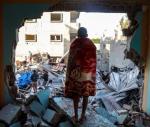You are here
Development priorities in Jordan
Oct 12,2017 - Last updated at Oct 12,2017
Despite its middle-income status, Jordan benefits from large amounts of development and humanitarian programmes. This is largely due to the fact that it hosts unprecedented numbers of refugees, as well as to its strategic positioning in the region’s current conflict dynamic.
These funds usually come from international donors who implement their development agendas and intervention programmes through local community organisations or governmental institutions.
This poses a question: Who is deciding on the development priorities in the country: the donors or the local communities?
Civil Society Organisations (CSOs) are principal development actors in Jordan. Formally, CSOs were mandated to present the local communities’ needs and address their issues, as well as empower them to take part in the decision- and policy-making processes affecting the populations they wish to help.
Such entities often lack the skills and capacities, however, to design surveys and research activities, to identify principal needs, causal drivers and impact pathways.
They also lack the core funding needed to strengthen their internal capacity, plan projects over longer timeframes or extend their reach to influence development policy debates at central level.
Development initiatives should, above all else, respond to local needs and priorities. They may be donor-initiated, but this should not mean that they respond to a donor agenda.
This often causes a collision of interests. For example, the priority of families in one area may be basic livelihoods, and for this reason this particular area may not be interested in capacity-building projects for youth or women.
But because most CSOs do not receive regular funds from the government to support their core work, they rely on international development grants to implement short-term projects. In doing so, they are not designing their own programmes, which tightens the space for sustainable and impactful strategies.
A needs assessment carried out by the West Asia-North Africa (WANA) Institute’s Civil Society team across 135 CSOs in Jordan found that funds are principally secured from international donors, such as the European Union, United Nations agencies and the World Bank.
Most CSOs identified the lack of funds as the primary obstacle to implementing and designing effective projects that meet the real needs of the community.
Development projects may lack impact for myriad reasons. They may focus principally on ameliorating weaknesses, rather than build on strengths. Or they may be transplanted from other regions or contexts without adaptation to take into account differences in culture, infrastructure, needs, the economic situation and community structure.
But more often, CSOs are excluded from the initial design and decision-making process.
Inadequate communication channels between CSOs, donors and authorities mean that local needs, priorities and insights do not inform the most basic decisions about what types of initiatives will be tendered for funding.
The empowerment of CSOs to take charge of community development agendas should be at the forefront of donors’ thinking.
New communication channels should be opened between CSOs, international donors and governmental institutions, and a meaningful agenda developed to align or reconcile these different parties priorities, objectives, insights and strengths.
Enhanced coordination mechanisms are also needed to ensure transparency and objectivity in designing and implementing development projects.
The writer is a researcher at the West Asia-North Africa (WANA) Institute Civil Society. He contributed this article to The Jordan Times.












